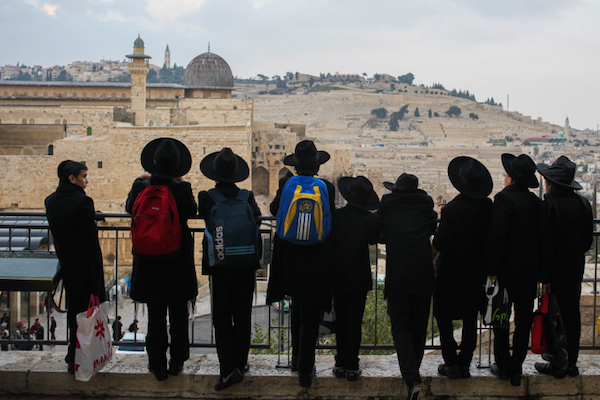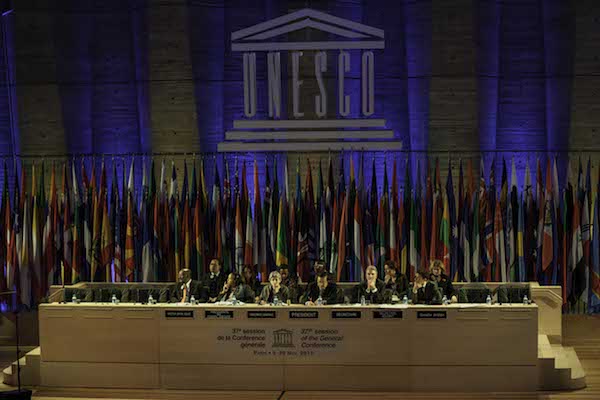The resolution was yet another shallow attack on identity elements, the same type I reject every time Israel does it to Palestinians. It was also a setback to the kind of UN action that could actually move the bar in a region that desperately needs it.
UNESCO has made a startlingly bad move in voting to affirm “Item 25,” a hodgepodge of condemnations and calls for Israel to stop policies that harm religious or cultural sites in Jerusalem, Hebron and Gaza. On Jerusalem, the text conspicuously referred to the holiest site by its Muslim name only: Al-Aqsa Mosque/Al-Haram Al-Sharif, pointedly neglecting – denying, many feel – the Jewish history of the site Jews call the Temple Mount. The declaration specifically noted the importance of the Old City to the three monotheistic faiths, a contrast which actually highlighted the excision of any Jewish connection to the actual holy site itself.
UNESCO can claim an ignoble feat of making me agree with Danny Danon, Israel’s ambassador to the UN, and maybe for the first time in living memory, with Prime Minister Benjamin Netanyahu himself. Both thrashed UNESCO for taking a blunt hatchet to ancient and modern sensibilities of the Jewish people.
Why did I take it so personally? I am not religious. But I hold degrees in both comparative religion and ethnonationalist conflict; I am also a practitioner working to untangle them. So I can say for certain: one doesn’t need any of those credentials, only common sense, to know that human beings hold their religious beliefs and ancient national mythology extremely dear. Many will kill and die for these things.

Israel and every other human society should evolve beyond physical violence for the sake of holy sites. But to deny spiritual connections is deeply disrespectful to those who simply feel connected to our history and tradition. I fasted on Yom Kippur, as one of my few outward expressions of tradition. A day later, UNESCO trampled on my heritage – rather the opposite of its mandate.
There is a more sinister historic and political implication to such language. The resolution dances close to the narrative that Jews have no connection to this land, but arbitrarily chose to settle here and colonize the rightful, exclusive, owners. It is a theme that is both incorrect and dangerous.
Beyond the bigger themes, this move was also a surefire way to empty the resolution of any potential concrete effectiveness. The heart of the statement is a call on Israel to stop activities that are harming the site and Muslim religious sensibilities, not only in Jerusalem – but also in Hebron and Gaza. Neither Israel nor anyone else will notice that now. To be sure, it is unlikely that Israel would have snapped into action if the Haram al-Sharif/Temple Mount had been judiciously described with both names. But anyone paying attention would have had to focus on substance rather than distraction. The deliberate language raises serious doubts about whether member states who voted in favor cared about the actual goals, or just wanted to commit a symbolic injury.
And the reverberations go beyond just UNESCO. Is this what the UN needs right now? Other agencies struggle for integrity in the Israeli-Palestinian conflict. It is not only right-wingers who are becoming skeptical of the decades-old UN Relief and Works Agency (UNRWA) that runs various aspects of life for Palestinian refugees. With good intentions, it may actually be disempowering Palestinians, by perpetuating dependency and inertia. The UN Human Rights Council has been fetishizing its condemnations of Israel for years, deflecting massive human rights violations of its other members, which currently include Burundi, Congo, Russia and Saudi Arabia (among others).
Finally, UNESCO’s foolish step is a setback to the kind of UN action that could actually move the bar in a region that desperately needs it. There has been strong speculation that the UN Security Council may seek to pass a resolution either condemning settlements or setting parameters for a two-state solution during President Obama’s “lame duck” period. This has raised a large question about whether Obama might withhold the automatic U.S. veto, as a parting statement. The UN needs all the credibility it can muster for this to happen, or for such a move to make any impression whatsoever in Israel. Already Israeli peace and human rights leaders who testified Friday at the UN Security Council on these issues were roundly condemned by politicians at home. It will be that much easier for Israel to explain away whatever the Security Council does next.
It’s true that Israelis have become resistant to the UN and nicer language would not have changed that. A UN agency should behave better not to score points with Israel but for its own integrity. It is also true that for most of Israel’s history the West has been fundamentally biased in favor of Israel, so the UN often provides needed balance. But the resolution wasn’t balanced; it was just another shallow attack on identity elements that I reject every time Israel does it to Palestinians. It is certainly not the UN’s role to throw matches into the most combustible religious heart of the conflict.


